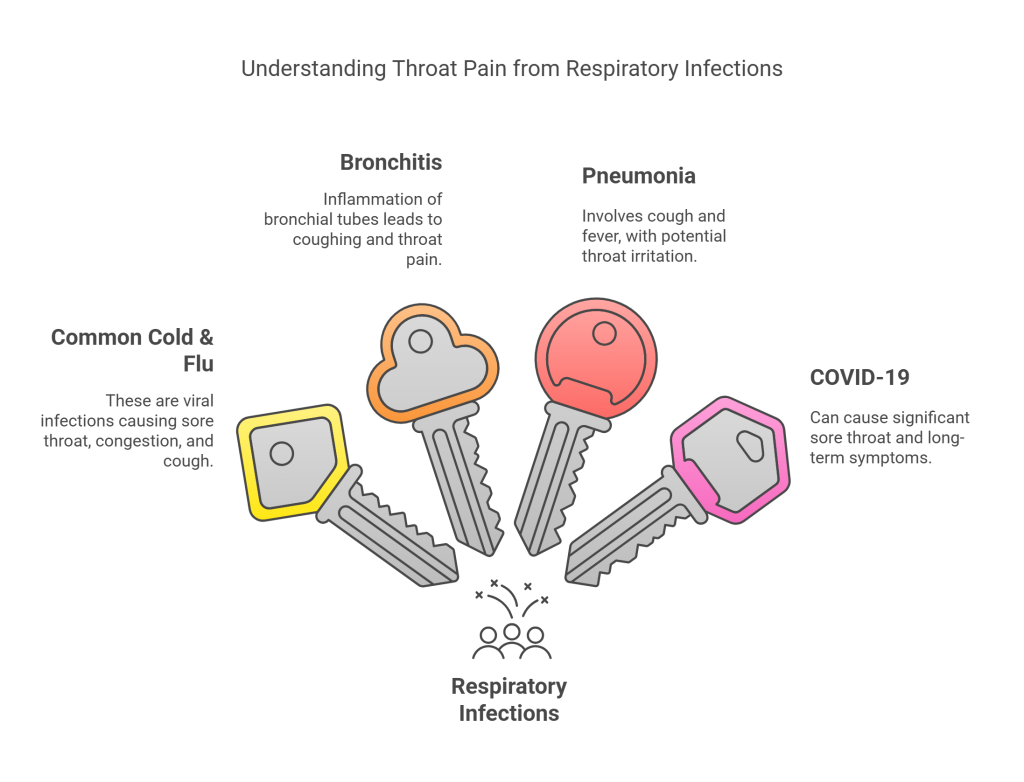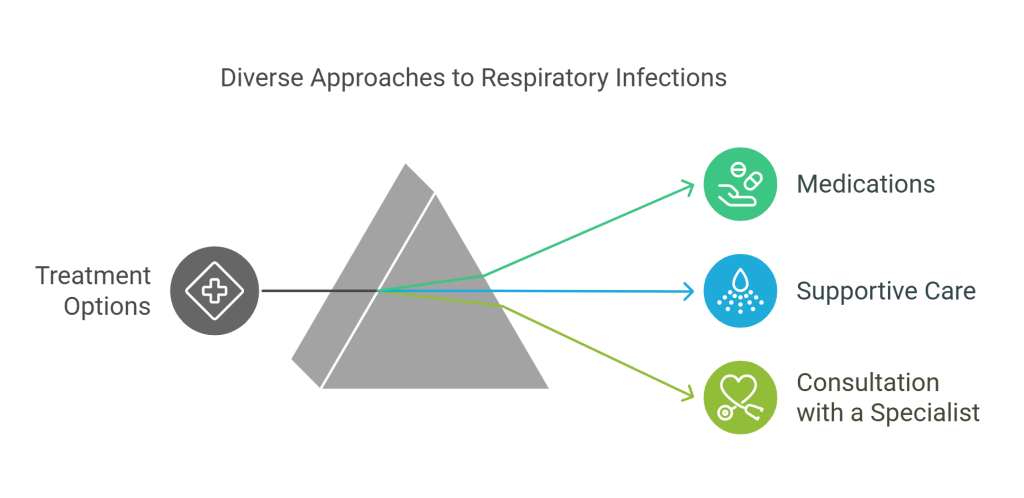Throat pain is a prevalent symptom that often accompanies respiratory infections. Understanding the connection between the respiratory system and throat pain is crucial, particularly when these symptoms persist or worsen. This comprehensive guide will explore the anatomy of the respiratory system, common respiratory infections that lead to throat pain, and provide pulmonology insights on diagnosis, treatment, and prevention.
Introduction
Throat pain can significantly impact daily activities, making swallowing and speaking uncomfortable. While it is often caused by conditions directly affecting the throat, it’s important to recognize when respiratory infections are the underlying culprit. Pulmonologists, specialists in respiratory conditions, provide valuable insights into how these infections can cause throat pain and the best approaches to treatment.
The Respiratory System Explained
The respiratory system includes the nose, throat, voice box, windpipe, and lungs. Infections in any part of this system can lead to inflammation that affects the throat. Understanding this connection helps in identifying the cause of throat pain and guiding treatment.
Common Respiratory Infections that Lead to Throat Pain

Several respiratory infections can cause throat pain, each with specific symptoms and treatment approaches.
- Common Cold and Influenza (Flu):
- Symptoms: Both illnesses can cause sore throat, congestion, cough, and body aches. The flu might also present with high fever and severe fatigue.
- Pulmonology Insights: Rest, hydration, and over-the-counter medications are typical treatments. Flu vaccinations are recommended as a preventive measure.
- Bronchitis:
- Explanation: Bronchitis involves the inflammation of the bronchial tubes, leading to heavy coughing that can agitate the throat.
- Impact: Both acute and chronic bronchitis can cause persistent coughing, which in turn results in throat pain.
- Pneumonia:
- Types and Symptoms: Bacterial, viral, and fungal pneumonia can cause cough, fever, chills, and make breathing painful. The cough can be dry or produce phlegm that irritates the throat.
- Connection: The persistent cough associated with pneumonia often leads to secondary throat pain.
- COVID-19:
- Specifics: Alongside other respiratory symptoms, COVID-19 can cause a significant sore throat due to viral infection and inflammation.
- Long-term Considerations: Some patients may experience lingering throat pain and other symptoms long after the initial infection has resolved.
How Respiratory Infections Cause Throat Pain
The link between respiratory infections and throat pain involves several physiological mechanisms:
- Mucus Overproduction: Respiratory infections can lead to excess mucus, which drips down the back of the throat, causing irritation and pain.
- Coughing: Frequent coughing can cause mechanical irritation and inflammation in the throat.
- Inflammation: Infections often lead to inflammation throughout the respiratory tract, including the throat.
Diagnosing Respiratory Infections and Throat Pain
Diagnosis of respiratory infections involves several steps:
- Physical Examination: Checking for swollen glands and listening to the lungs.
- Imaging Tests: Chest X-rays or CT scans can be used to see the lungs and airways.
- Spirometry: Measures lung function and can be used to assess the impact of chronic respiratory diseases like asthma or chronic obstructive pulmonary disease (COPD).
Treatment Options and Pulmonology Recommendations

Treatment varies based on the infection:
- Medications: Antibiotics for bacterial pneumonia, antivirals for influenza, and corticosteroids for severe inflammation.
- Supportive Care: Increasing fluid intake, using humidifiers, and taking throat lozenges can soothe throat pain.
- Consultation with a Specialist: In cases where respiratory infections are frequent or severe, it is advisable to consult a pulmonologist. If you’re looking for expert care in this field, consider visiting the best pulmonology in Ranchi for specialized treatment and advice.
Preventive Measures and Pulmonology Advice
Preventing respiratory infections is key to avoiding throat pain:
- Vaccinations: Regular vaccinations for flu and pneumonia.
- Hygiene Practices: Frequent handwashing and avoiding close contact with sick individuals.
- Healthy Lifestyle: Maintaining a healthy diet and exercise routine to boost the immune system.
Frequently Asked Questions (FAQs)
How can I tell if my throat pain is from a cold or something more serious?
Throat pain accompanied by high fever, shortness of breath, or persistent symptoms could indicate a more serious infection like pneumonia or COVID-19.
Are there any home remedies that can help with throat pain from respiratory infections?
Yes, warm teas, throat lozenges, and steam inhalation can provide relief. However, it’s important to address the root cause of the infection.
When should I seek medical help for throat pain?
If throat pain is severe, persists for more than a week, or is accompanied by other serious symptoms like difficulty breathing or swallowing, medical attention should be sought immediately.
Conclusion
Understanding the connection between respiratory infections and throat pain is vital for effective treatment. By recognizing the signs and seeking appropriate medical care, patients can manage symptoms and prevent complications. For specialized care, particularly in complex or persistent cases, the expertise of a pulmonologist is invaluable. If you’re experiencing recurrent respiratory issues accompanied by throat pain, consider seeking out the best pulmonology care in Ranchi.
.svg)










